You are here
BRT third phase begins in Sweileh
By JT - Jun 11,2017 - Last updated at Jun 11,2017

The third phase includes building a 600-metre-long bridge that connects Queen Rania Street with Yajouz Street, in addition to establishing 800-metre-long lanes for the BRT (Photo by Ahmed Bani Mustafa)
AMMAN — The Greater Amman Municipality (GAM) on Saturday inaugurated the third phase of the Bus Rapid Transit (BRT) project at the highway patrol intersection near Sweileh, known as the Dawriyat intersection, the Jordan News Agency, Petra, reported on Sunday.
This phase of the project, worth JD4 million, will include building a 600-metre-long bridge that connects Queen Rania Street with Yajouz Street, in addition to establishing 800-metre-long lanes for the BRT.
The phase also includes establishing a service station for public transportation and a loading station to serve the Jubeiha and Shafa Badran areas.
During the inauguration ceremony, President of GAM Committee Yousef Shawarbeh said that the BRT will constitute a foundation stone for a comprehensive transport network in Amman, where residents will feel the improvements in the sector, in relation to buses, pavements and modern bus stops.
Shawarbeh added that building modern and safe transport schemes in the city will encourage people to use public transport, as it will be safer, quicker and cheaper than using private vehicles.
The BRT will have a capacity of 120 passengers per bus, serving almost 25km of Amman’s streets, according to GAM officials.
In June 2015, GAM and the French Agency for Development signed an agreement to fund the BRT project with $152 million.
French Ambassador to Jordan David Bertolotti commended the work’s progress in the project, stressing France’s continuous support to the scheme that will help develop the transport system in the capital, Petra added.
The total cost of the project is $166 million, $14 million of which was spent when the BRT project started in 2010. Work on the project stopped in the summer of 2011 amid concerns over its feasibility and funding capacities, which saw the Cabinet suspend it and halt all related tenders.
In 2013, the government decided to resume the project, as part of a plan to provide transport solutions and ease traffic congestion in Amman.
Related Articles
AMMAN — President of the Greater Amman Municipality (GAM) committee Yousef Shawarbeh on Thursday inspected the progress of the third phase o
AMMAN — The Greater Amman Municipality (GAM) will start working on the third stage of the Bus Rapid Transit (BRT) project in early July, add
AMMAN — The Greater Amman Municipality (GAM) is scheduled to float two tenders this week for the construction of overpasses above the Sports

















